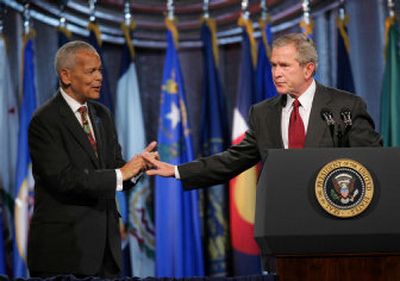Bush makes first visit to NAACP

WASHINGTON – President Bush, addressing the NAACP after skipping its convention for five years, said Thursday he knows racism exists in America and that many African American voters distrust his Republican Party.
Bush lamented the GOP’s rocky relations with blacks. He pledged to improve that relationship and work with the NAACP’s new leader to achieve common goals.
“I understand that racism still lingers in America,” Bush told more than 2,200 people at the National Association for the Advancement of Colored People’s annual gathering. “It’s a lot easier to change a law than to change a human heart. And I understand that many African Americans distrust my political party.”
That line generated boisterous applause and cheers from the audience, which generally gave the president a polite, reserved reception.
“I consider it a tragedy that the party of Abraham Lincoln let go of its historical ties with the African American community,” Bush said. “For too long, my party wrote off the African American vote, and many African Americans wrote off the Republican Party.”
Black support for Republicans in elections has hovered around 10 percent for more than a decade. In 2004, Bush drew 11 percent of the black vote against Democrat John Kerry.
Most of the president’s talk generated a smattering of applause. But many in the convention center stood and clapped when he urged the Senate to renew a landmark civil rights law passed in the 1960s to end racist voting practices, such as poll taxes and literacy tests, in Southern states.
For five years in a row, Bush had declined invitations to address the oldest and largest civil rights organization in the nation. This year, he said yes, knowing that he would be facing a tough crowd.
According to AP-Ipsos polling conducted in June and July, 86 percent of blacks disapprove of the way Bush is handling his job, compared with 56 percent of whites who disapprove.
While the audience was cordial, some NAACP members were disappointed that the president did not mention the war in Iraq. During Bush’s speech, two NAACP members from Louisiana held their hands in the air to display the two-fingered, “V” peace symbol.
Others expressed dismay that Bush did not offer more substantive remarks about issues such as education and the economy. The unemployment rate for blacks was 9 percent in June – nearly twice the national jobless rate of 4.6 percent
“There was an amazing gap between the aspirations of his speech and the policy behind it. It was so vague,” said Barbara Arnwine of the Washington-based Lawyers’ Committee for Civil Rights Under Law.
The administration’s relations with the NAACP have been sketchy at best.
The organization’s former president, Kweisi Mfume, once described Bush’s black supporters as “ventriloquists’ dummies” and said the president’s decision not to speak at the NAACP conventions was an insult.
Relations have improved under the leadership of new NAACP President Bruce Gordon.
Gordon, who introduced Bush at the convention, has met with him three times in the year that he has headed the civil rights group. That compares with one meeting Bush had with Mfume, Gordon’s predecessor.
Toward the end of his remarks, two protesters interrupted the president, shouting inquiries about Vice President Dick Cheney and the situation in the Middle East.
Bond approached the microphone, but Bush told him not to bother trying to quell the disturbance. “Don’t worry,” Bush told Bond. “I’m almost done.”